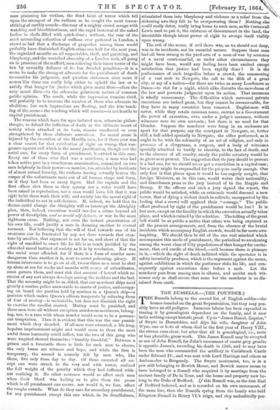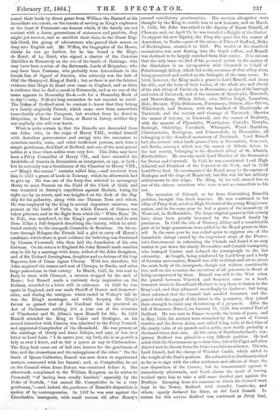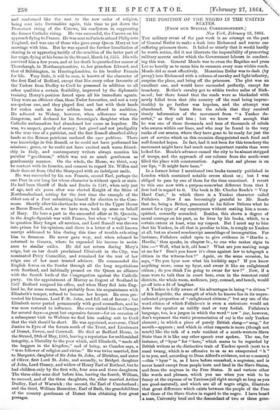THE RUSSELLS.—(THE FOUNDER.)
THE Russells belong to the second list. of English nobles—the houses founded on the great Sequestration, but they may pos- sibly have an old pedigree. Immense labour has been expended in tracing it by genealogists dependent on the family, and it now lacks nothing except historic proof. Up to "James Russel, Esquier," of Swyre in Dorsetshire, and Alps his wife, daughter of John Wyse, one or both of whom died in the first year of Henry the stream runs clear, but after that all is genealogical, i.e., more or less plausible, guess-work. This James RussP11 may be accepted as son of John Russell, for John's monument of coarse grey granite is opposite James's, recording his death in 1505, and he may have been the man who commanded the artillery in Carisbrook Castle under Edward IV., and was sent with Lord Hastings and others as Ambassador to Burgundy. The Swyre monument, too, is in a pew still belonging to Bewick House, and Bewick manor seems to have belonged to a Russell who acquired it by marriage from the ancient family of De la Tour, and the house and property now be- long to the Duke of Bedford. If this Russell was, as the first Earl of Bedford believed, and as is recorded on his own monument, of the same line, then the Russells spring from the family who held Kingston-Russell in Henry VL's reign, and they undoubtedly pos-
sessed their lands by direct grant from William the Bastard or his immediate successors, on the tenure of serving as King's cupbearer at the feast of Pentecost—an honour which, if the family are not content with a dozen generations of statesmen and patriots, they might yet recover, and so establish their claim to the bluest Eng- lish blood, the group of adventurers who graved their names so deep into English soil. Mr. Wiffen, the biographer of the House, thinks he can go farther, for he has found a Sir Hugh de Rozel, of Le Rozel, who signed a charter of the Countess Matilda's in Normandy on the eve of the battle of Hastings, who may have been a scion of the Bertrazuls, Lords of Briquebec, who may have been Turstans, who probably were descendants in the female line of Signed of Sweden, who certainly was the heir of Olaf the Sharpeyed, King of Rurik ; but as there is not the faintest evidence that Hugh de Rozel ever came to England, and as there is evidence that he died a monk in Normandy, and as no one of the name appears in Domesday Book,—oh for a Domesday Book of to day !—why, Wiffen's long researches do not amount to much.
The Dukes of Bedford must be content to know that they belong to a family originally French, which came over from somewhere immediately after the Conquest, but whether from Le Rozel in Briquebec, or Rozel near Caen, or Rozel in Jersey, neither they nor anybody else will ever know.
What is quite certain is, that the Russells are descended from one John, who, in the reign of Henry VIII., worked himself
with dauntless perseverance and energy into the succession to countless monks, nuns, and other inefficient persons, and, born a simple gentleman, died Earl of Bedford, and one of the most potent nobles at a time when nobles were very few. This John may have been a Privy Councillor of Henry VII., and have attended the Archduke of Austria in Dorsetshire as interpreter, or spy, or both ; but he certainly was a Gentleman of the Chamber to Henry
—" King's Ere-screen" enemies called him, —and received from him in 1513 a grant of lands in Tourney, which he afterwards had
to give up. He was one of the forty-five selected to accompany Henry to meet Francis on the Field of the Cloth of Gold, and was wounded in Surrey's expedition against Morlaix, losing his right eye by an arrow, and was knighted on the deck of the flag- ship for his gallantry, along with one Thomas More and others. He was employed by the King in several important missions, was present at the battle of Pavia, in which Francis of France was taken prisoner, and in the flight from which the " White Rose," De is Pole, was murdered, to the King's great content, and he sent from Milan a full despatch describing the victory, which he attri- buted entirely to the renegade Constable de Bourbon. On his re- turn through Bologna the French laid a plot to carry off Henry's confidant, which there is good evidence for believing was frustrated by Thomas Cromwell, who then laid the foundation of his own fortunes. On his return to England Sir John Russell made another step in life by a marriage with Anne, widow of Sir John Boughton, and of Sir Richard Jerningham, daughter and co-heiress of Sir Guy Sapcotes, heir of Dame Agnes Cheney. With her, therefore, Sir John acquired the manor and seat of Cheneys, in Bucks, and other large possessions in that county. In March, 1527, he was sent to Italy to treat with Clement, a mission stopped by the sack of Rome; but Russell made a curiously deep impression on the Italians, recorded in a letter still in existence. In 1528 he was again in England, and was made Sheriff of Dorset and Somerset- shire, and during the intrigues which ended in Wolsey's fall he was the King's messenger, and while keeping the King's favour so gained that of the Cardinal that he procured an Act of Parliament settling 201. a year out of the revenues of Winchester and St. Alban's upon Russell for life. In 1532 Russell attended the King to Calais and Boulogne, on his second interview with Francis, was admitted to the Privy Council, and appointed Comptroller of the Household. He was present at the marriage of Henry and Anne Boleyn, and says of her, in a letter to Lord Lisle, " I do assure you, my lord, she is as gentille a lady as ever I knew, and as fair a queen as any in Christendom. The King hath come out of hell into heaven for the gentleness of this, and the crossedness and the unhappiness of the other." On the death of Queen Catherine, Russell was sent down to superintend matters connected with her funeral ; and, as Comptroller, he sat on the Council when Anne Boleyn was examined before it. She afterwards complained to Sir William Kingston (as he writes to Cromwell) "of having been cruelly handled," especially by the Duke of Norfolk, " but named Mr. Comptroller to be a very gentleman,"—and, indeed, the gentleness of Russell's disposition is spoken of by contemporaries. In 1537 he was sent against the Lincolnshire insurgents, with small success till after Henry's second conciliatory proclamation. His services altogether were thought by the King to entitle him to new honours, and on March 9, 1539, Sir John was raised to the dignity of Baron Russell, of Cheneys, and, on April 23, he was installed a Knight of the Garter. To support his new dignity, the King also gave him the manor of Amersham, in Bucks—part of the estate of Edward Stafford, Duke of Buckingham, attainted in 1521. The wealth of the dissolved monasteries was now flowing into the Royal coffers, and Russell was destined to be largely enriched from that source. It is curious that the only trace we find of his person,11 action in the matter of the dissolution is an interposition with Cromwell in behalf of Peterborough Abbey, which led to the revenues of that abbey alone being preserved and settled on the bishopric of the same name. In 1510, however, the King made a grant to Lord Russell, and Anne his wife, and the heirs of their bodies, of the whole site and circuit of the rich abbey of Tavistock, in Devonshire, as also of the borough and town of Tavistock, and of the manors of Ilandwyke, Morewell, and Morewelham, Milton Abbot, alias Milton Leigh, Lamerton, Hole, Brenter, Wyke Dabermon, Peterstavye, Ottrew, alias Otteve, Whitchurch, and Newton, with the hundred of Haudewyke or Tavistock, and the rectory and vicarage of Tavistock ; likewise the manor of Antony, in Cornwall, and the manor of Denbury, with the manors of Plymstoke, Worrington, Cowyke, Enwyke, Burleigh, Olderidge, Cavelinch, Whimpole, Wood - Marshton, Christenstowe, Borington, and Cornwedede, in Devonshire, all belonging to the dissolved monastery of Tavistock. Lord Russell had also several other lands granted him in Devonshire, Somerset, and Bucks, amongst which was the manor of Abbots Aston, in the last county, belonging to the dissolved abbey of St. Alban's, Hertfordshire. He was also made Lord Warden of the Stannarics for Devon and Cornwall. In 1541 he was constituted Lord High Admiral and President of the Council in the West, and in 1543 Lord Privy Seal. lie accompanied the Royal army to the capture of Boulogne and the siege of Montrenil, but this was his last military achievement in this reign. The King, by his will, named him as one of the sixteen executors who were to act as counsellors to his son.
The accession of Edward, so far from diminishing Russell's position, brought him fresh honours. He was confirmed in his office of Privy Seal, acted as High Steward at the young King's coro- nation, and in the same year he had a grant of the monastery of Woeums, in Bedfordshire. The large original grants in this county have since been greatly increased by the Russell family by purchases. In 1549 the site of Thorney Abbey and a considerable part of its large possessions were added to the Royal grants to Rus- sell. In the same year he was called again to suppress one of the formidable risings caused by the imprudent steps of the Protec- tor's Government in reforming the Church, and found it no easy matter to put down the sturdy Devonshire and Cornish insurgents, who besieged Exeter, and reduced the townspeople to the last extremity. At length, being reinforced by Lord Grey and a body of German mercenaries, Russell was able to defeat and cut to pieces the main body of the insurgents, though not without considerable loss, and on one occasion the execution of all prisoners in dread of being overpowered by them. Russell was still in the West when the quarrel between Warwick and Somerset came to a head. Somerset wrote to Russell and Herbert to beg them to hasten to the King's aid, and they advanced accordingly to Andover ; but being there informed that the Council had assailed Somerset, and dis- gusted with the appeal of the latter to the peasantry, they joined their strength to resist any threatening of a jacquer•ie. After the fall of Somerset, Russell, on January 19, 1550, was created Earl of Bedford. He was sent to France to settle the terms of peace, and in May, 1552, his services were rewarded by the grant of Covent Garden and the Seven Acres, now called Long Acre, at that time of the yearly value of six pounds and a noble, now worth probably a thousand times that sum. At the crisis of Northumberland's con- spiracy Bedford was placed in a very difficult position. He had acted with the Government up to that time, but with Paget and'other shrewd men he shrank from the Duke's ambitious schemes. His son, Lord Russell, had the charge of Windsor Castle, which added to the weight of the Earl's position. He submitted to Northumberland so far as to sign with the other noblemen and officers of State the new disposition of the Crown ; but he remonstrated against it immediately afterwards, and Cecil claims the merit of having worked upon him to take a still more decided part against the Dndleys. Escaping from the restraint in which the Council were kept in the Tower, Bedford, with Arundel, Pembroke, and others, openly declared for Mary, as did Lord Russell. In return for this service• Bedford was confirmed as Privy Seal,
and conformed like the rest to the new order of religion, being sent into Devonshire again, this time to put down the Protestant rising of the Carews, his coadjutors in suppressing the former Catholic rising. He was successful, the Carews on his approach flying to France. He was sent to Paris to attend Philip into England, and was one of those who gave away Queen Mary at her marriage with him. But he was spared the further humiliation of sharing in or approving tacitly of the cruelties of the latter part of her reign, dying at his house in the Strand, March 14,1555. His wife survived him a few years, and at her death bequeathed her manor of Thornhaugh, in Northamptonshire, to ,her grandson Edward, and that of Stibbington, in Huntingdonshire, to his brother Francis for life. Very little, it will be seen, is known of the character of the first Earl of Bedford, except that like every other favourite of the Tudors from Dudley to Cecil he possessed in addition to all other qualities a certain flexibility, improved by the diplomatic training Henry's position forced upon all his immediate agents. They were an efficient class, these Tudor favourites, and not a very scrupulous one, and they played first and last with their heads for stakes such as have seldom been offered to ambition. He adhered to Wolsey, however, when adherence was very dangerous, and declared for his Sovereign's daughter when the Catholic ambassadors had abandoned her cause as hopeless. He was, we suspect, greedy of money ; but greed and not prodigality is the true vice of a patriciat, and the first Russell absorbed abbey lands as the Roman patrician enclosed the ager publicus. There was knowledge in this Russell, or he could not have performed his missions ; grace, or he could not have excited such warm friend- ship in Italy, and contemporary writers always mention his peculiar " gentleness," which was not so much gentleness as gentlemanly manner. On the whole, the House, we think, may be content with its founder, and consent to regard Mr. Wiffen and their descent from Olaf the Sharpeyed with an indulgent smile.
He was succeeded by his son Francis, second Earl, perhaps the one Peer in our long list whose character is without speck or stain. He had been Sheriff of Beds and Bucks in 1547, when only just of age, and six years after was elected Knight of the Shire of Northumberland, setting for the first time the example of the eldest son of a Peer submitting himself for election to the Com- mons. Shortly after his election he was called to the Upper House as Baron Russell, and, as we have seen, took up arms on behalf of Mary. He bore a part in the successful affair at St. Quentin, in the Anglo-Spanish war with France, but when " religion" was in question Mary forgot all services, and Lord Russell was thrown into prison for his opinions, and there is a letter of a well known martyr addressed to him during this time of trouble exhorting him to firmness. He never gave way, and when released he returned to Geneva, where he expended his income in assist- ance to similar exiles. He did not return during Mary's reign, but on her death proclaimed Elizabeth in the City, was nominated Privy Councillor, and remained for the rest of her reign one of her most trusted advisers. He commanded the English forces on the Border through all the long negotiations with Scotland, and habitually pressed on the Queen an alliance with the Scotch lords of the Congregation against the Catholic party. On the appointment of Murray as Regent of Scotland in 1567 Bedford resigned his office, and when Mary fled into Eng- land he, for some reason, but probably from his acquaintance with Elizabeth's temper, refused to become her keeper. He even pre- vented his kinsman, Lord F. St. John, and fell out of favour ; but Elizabeth never parted permanently with good counsellors, and he was soon restored to influence. She even visited him at Cheneys for several days—a great but expensive favour—for on occasion of a subsequent visit to Woburn we find him making suit to Cecil that the visit should be short. He was appointed, moreover, Chief Justice in Eyre of the forests south of the Trent, and Lieutenant of Dorset, Devon, and Cornwall. He died at Bedford House, in the Strand, 28th of May, 1585, leaving a reputation for unblemished integrity, a liberality to the poor which, said Elizabeth, "made all the beggars in the kingdom," and of being, as Camden says, a " true follower of religion and virtue." He was twice married, first to Margaret, daughter of Sir John St. John, of Bletshoe, and sister of Oliver, first Lord St. John, and secondly, to Bridget, daughter of John, Lord Hussey, and widow of Henry Earl of Rutland, but he had children only by the first wife, four sons and three daughters. The three elder sons died before him, leaving the fourth, William, to succeed, and of the three daughters, the elder married Arthur Dudley, Earl of Warwick ; the second, the Earl of Cumberland ; and the third, William Bourchier, Earl of Bath, the grandchildren of the country gentleman of Dorset thus obtaining four great peerages.
































 Previous page
Previous page